May 21, 2025 | 10:10 GMT +7
May 21, 2025 | 10:10 GMT +7
Hotline: 0913.378.918
May 21, 2025 | 10:10 GMT +7
Hotline: 0913.378.918
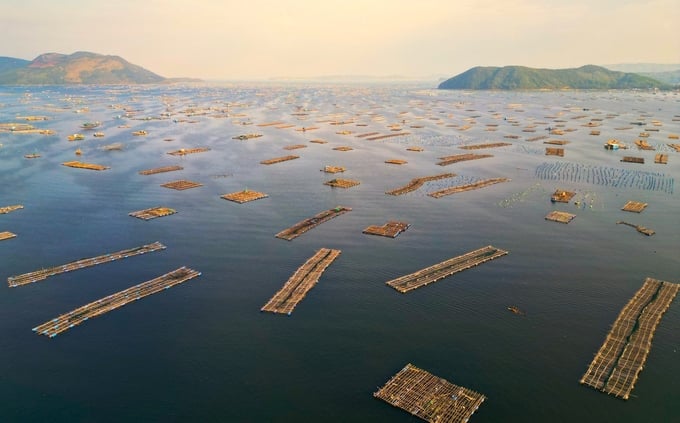
The density of lobster cages in Song Cau town is high. Photo: MN.
In the 1990s, the provinces of Phu Yen and Khanh Hoa initiated cage aquaculture due to their extensive coastlines, numerous lagoons, and bays. Lobsters and a variety of marine fish are the primary species that are cultivated. The national focus of today is lobster cage cultivation in these localities.
It is possible to assert that marine aquaculture (also referred to as sea farming) in Phu Yen and Khanh Hoa not only provides economic advantages to producers but also makes a substantial contribution to the provinces' agricultural, forestry, and fisheries economic structures. Nevertheless, despite these accomplishments, marine aquaculture in these regions continues to encounter numerous constraints and obstacles.
For example, the Cu Mong Lagoon (2,600 hectares), Xuan Dai Bay (8,000 hectares), and more than 1,300 hectares in offshore waters in Song Cau Town (Phu Yen) offer significant potential for marine aquaculture.
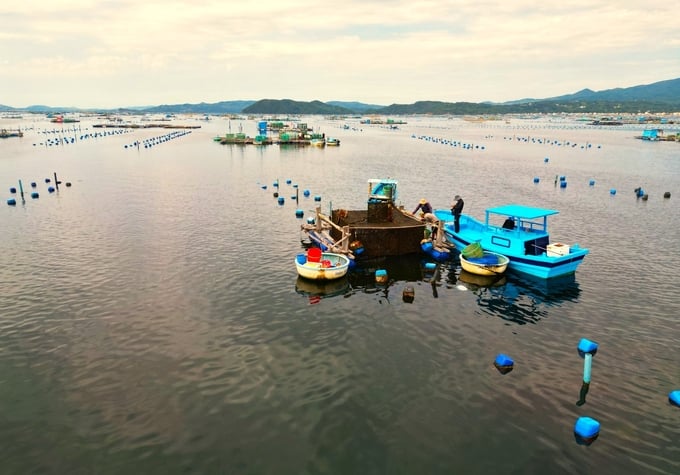
Currently, Phu Yen and Khanh Hoa provinces have great potential for marine farming. Photo: MN.
In accordance with the provincial People's Committee and the Town Party Committee's directives, the Song Cau Town People's Committee issued Plan No. 102 on March 29, 2024, to improve the state's administration of cage aquaculture for 2024. A survey identified 4,196 aquaculture households that collectively operated 6,390 cages, including 3,376 oyster cages and 3,014 lobster cages, as well as 134,612 fish cages and 129,321 cages for commercial lobster cultivation.
The primary challenge in lobster cultivation, according to Mr. Lam Duy Dung, Vice Chairman of the Song Cau Town People's Committee, is the difficulty in managing quantity, quality, and restocking seasons due to the primarily imported seed stock. The majority of producers continue to employ traditional wooden cages, outmoded technology, high stocking densities, and fresh feed in the absence of proper regulations, which increases the likelihood of environmental harm, natural disasters, and disease outbreaks.
Mr. Doan Van Quang, Director of the Song Cau Lobster Comprehensive Services Cooperative, observed that lobster cultivation is becoming more difficult. The loss rates from provisioning to harvest are substantial, with some households experiencing a total loss of up to 50% of their yield. High confinement densities have a negative impact on lobster health by reducing water circulation, in addition to climate change and weather issues.
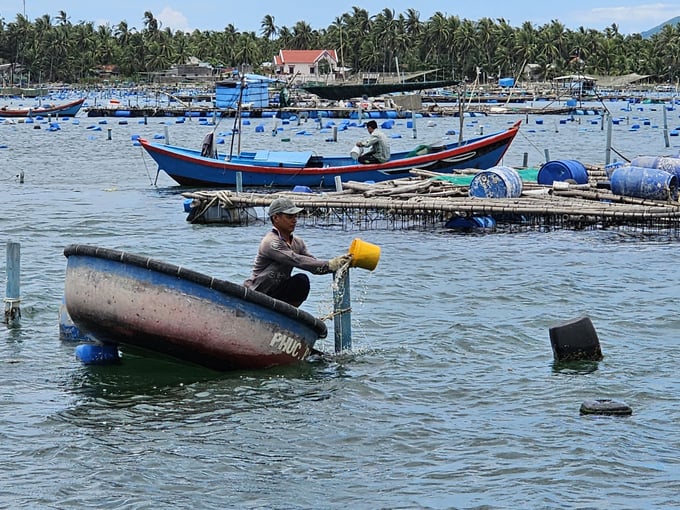
Lobster farmers feed lobsters mainly with fresh food. Photo: KS.
The Phu Yen Department of Agriculture and Rural Development (DARD) reports that the province had more than 186,000 aquaculture cages by the end of June 2024, which is 3.8 times the number of cages proposed in Resolution No. 99 (dated December 8, 2017, of the Provincial People's Council) and an 87% increase from 2019.
Mr. Nguyen Tri Phuong, Deputy Director of Phu Yen DARD, emphasized that lobster aquaculture generates employment opportunities for nearly 6,000 households; however, the dense cage configurations present substantial risk to the environment. Furthermore, diseases such as opaque hemolymph and black gill result in annual losses of 20-30% in lobster aquaculture.
Two abrupt lobster and fish fatalities in Song Cau Town between May and June 2024 were the result of environmental factors, resulting in a total of 45.7 billion VND in damages. Investigators discovered that the proliferation of mollusk aquaculture for lobster feed and the high cage densities were impeding water circulation.
Van Ninh, Ninh Hoa, Nha Trang, and Cam Ranh are the four primary cage agricultural regions in Khanh Hoa Province. The principal locations for lobster and marine fish aquaculture are Van Phong Bay (Van Ninh) and Cam Ranh Bay (Cam Ranh City), where densely packed cages are located near the shore.
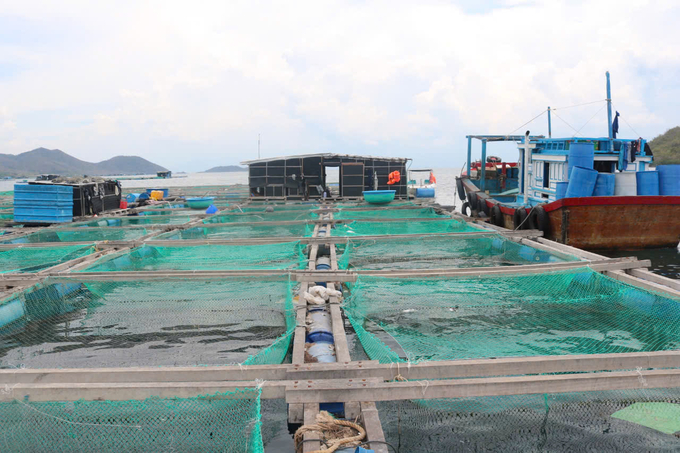
Seafood cages in Van Phong Bay, Khanh Hoa Province. Photo: KS.
The Van Ninh Economic Department reports that the district presently has approximately 42,000 aquaculture cages, with lobster farming accounting for approximately 50% of the total. These cages are predominantly located in Van Thanh Commune. In addition to the 350 hectares designated for aquaculture in Provincial People's Committee Decision No. 5321 (dated June 14, 2022), numerous households are cultivating outside of these areas.
Mr. Nguyen Xuan Hoa, a lobster cultivator with extensive experience in Van Gia Town (Van Ninh District), observed that numerous expatriates have initiated an unsanctioned aquaculture operation in Van Phong Bay. This has led to a decrease in water quality and an increase in confinement densities. Additionally, waste management is frequently disregarded, resulting in the improper disposal of household refuse and feed residues, which worsens environmental and disease risks and diminishes profitability.
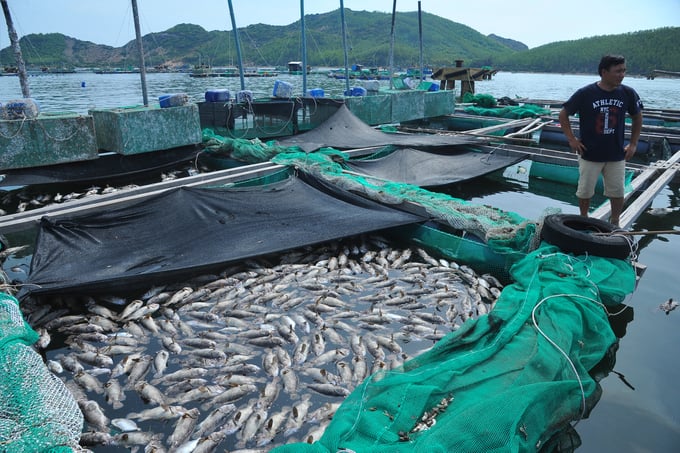
In May - June 2024, Phu Yen province experienced a phenomenon of large numbers of lobsters and sea fish dying. Photo: KS.
In Cam Ranh Bay, Mr. Le Ngoc Thach, Chairman of the Cam Ranh City People's Committee, reported that there are nearly 100,000 aquaculture enclosures, predominantly for green lobster. He cautioned that the dense cage arrangements present substantial environmental hazards.
According to Mr. Nguyen Duy Quang, Director of Khanh Hoa DARD, the efficacy of lobster farming has been diminished as a result of unregulated, nearshore lobster farming, which has resulted in environmental degradation, increased disease risks, and conflicts with other economic sectors. Additionally, some farming areas encroach on shipping lanes and anchorage zones, obstructing maritime traffic and compromising waterway safety.
Translated by Linh Linh

(VAN) Dong Thap farmers attained an average profit margin of 64% during the summer-autumn 2024 crop (first season), while An Giang and Kien Giang farmers followed with 56% and 54%, respectively.

(VAN) As a doctoral student doing research on renewable energy and electrification at Harvard University, the author shares his musings on electricity, nature, and countryside memories.

(VAN) The decree on Extended Producer Responsibility (EPR) ensures transparent management and disbursement of support funds, avoiding the creation of a “give-and-take” mechanism.

(VAN) Hue City rigorously enforces regulations regarding marine fishing and resource exploitation, with a particular emphasis on the monitoring of fishing vessels to prevent illegal, unreported, and unregulated (IUU) fishing.

(VAN) Hanoi People's Committee has issued a plan on reducing greenhouse gas emissions in the waste management sector with 2030 vision.

(VAN) Vietnam's draft amendment to Decree No. 156 proposes a mechanism for medicinal herb farming under forest canopies, linking economic development to population retention and the sustainable protection and development of forests.

(VAN) In reality, many craft village models combined with tourism in Son La have proven effective, bringing significant economic benefits to rural communities.